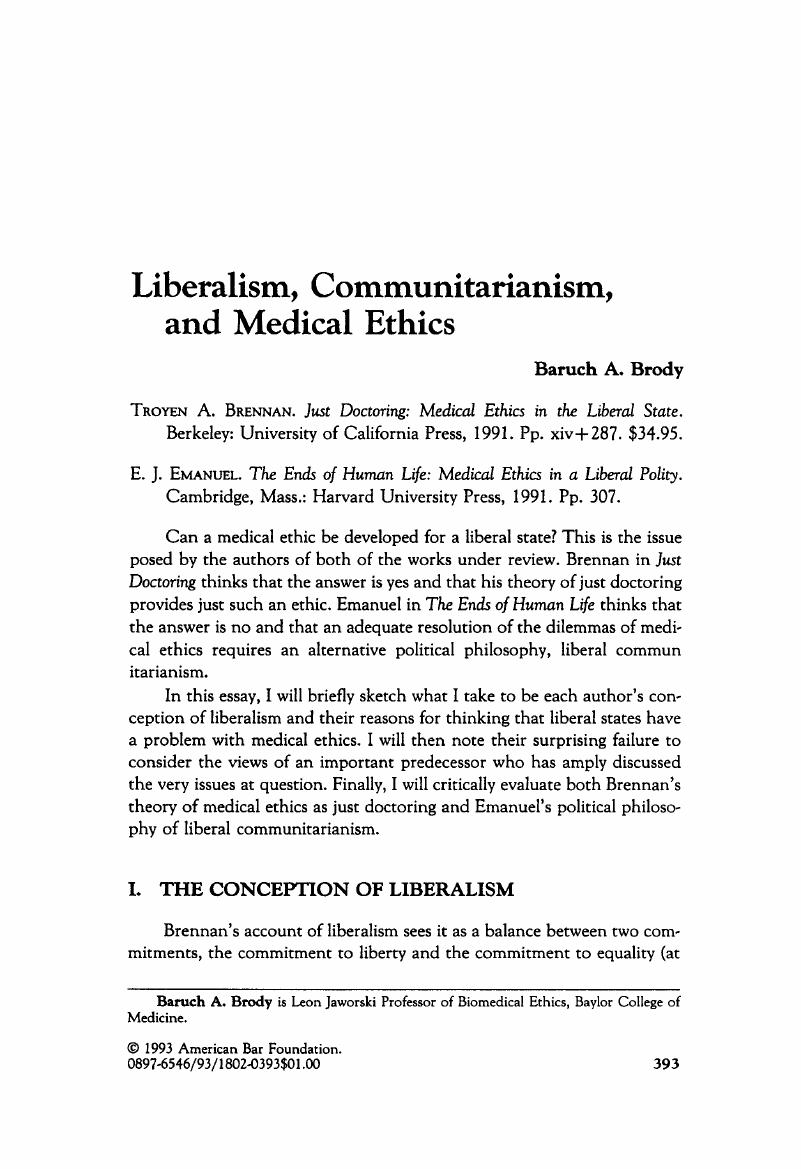No CrossRef data available.
Article contents
Liberalism, Communitarianism, and Medical Ethics
Published online by Cambridge University Press: 27 December 2018
Abstract

- Type
- Review Essay
- Information
- Copyright
- Copyright © American Bar Foundation, 1993
References
1 It goes back at least as far as Robert M. Veatch's long-standing critique of professional ethics, summarized in his Theory of Medical Ethics (New York: Basic Books, 1981). Veatch and others had been raising these critiques throughout the 1970s.Google Scholar
2 Unfortunately, defenders such as Edwin D. Pellegrino & David C. Thomasma, For the Patient's Good (New York: Oxford University Press, 1988), have not taken this approach to defending the classical ethic.Google Scholar
3 For a presentation of both of these standards and the reasons for using one or the other, see Allen Buchanan & Daniel Brock, Deciding for Others: The Ethics of Surrogate Decisionmaking (New York: Cambridge University Press, 1990).Google Scholar
4 Many have advocated health insurance voucher schemes. The Heritage Foundation, for example, has developed such a scheme in a series of publications, including Butler, Stuart M., “A Tax Reform Strategy to Deal with the Uninsured 265 J.A.M.A. 2541 (1991). 1 have, in a series of writings, argued that it is the solution to the problem of how to choose which services to cover in a way that is compatible with respecting individual differences in values. See, e.g., Brody, Baruch, “Wholehearted and Halfhearted Care: National Policies vs. Individual Choices,” in Spicker, Stuart et al, Ethical Dimensions of Geriatric Care (Dordrecht: Reidel, 1987), and Baruch Brody, “The Macro-Allocation of Health Care Resources” in Hans-Maltis Sass & Robert V. Massey, Health Care Systems (Dordrecht: Reidel, 1988).CrossRefGoogle ScholarPubMed
5 Details about how this would work are provided in Baruch Brody, Life and Death Decision Making 30–32 (New York: Oxford University Press, 1988).Google Scholar
6 E.g., Uhlmann, R. F., Pearlman, R. A., & Cain, K. C., “Physicians' and Spouses' Predictions of Elderly Patients' Resuscitation Preferences,” 43 J. Gerontology M115 (1988).CrossRefGoogle ScholarPubMed
7 The Patient Self-Determination Act (sec. 4026(a) of OBRA'90) requires hospitals to provide information at the time of admission about advance directives and about informed consent.Google Scholar
8 Many of the details of the Oregon process and its resulting priorities are found in Office of Technology Assessment, Evaluation of the Oregon Medicaid Proposal (Washington, D.C.: U.S. Congress, 1992).Google Scholar
9 His work, developed over many years, is summarized in H. T. Engelhardt Jr., The Foundations of Bioethics (New York: Oxford University Press, 1986).Google Scholar
10 Emanuel, Ezekiel, “Do Physicians Have an Obligation to Treat Patients with AIDS 318 New Eng. J. Med. 1686 (1988).CrossRefGoogle ScholarPubMed
11 Abigail Zuger & Steven Miles, H., “Physicians, AIDS, and Occupational Risk,” 258 J.A.M.A. 1924 (1987).Google Scholar
12 Arras, John, “The Fragile Web of Responsibility,” 15 Hastings Center Rep. 11 (1988).Google Scholar
13 President's Commission, I Securing Access to Health Care 20 (Washington, D.C.: Government Printing Office, 1983).Google Scholar
14 Many more details are sketched in his ch. 6.Google Scholar


